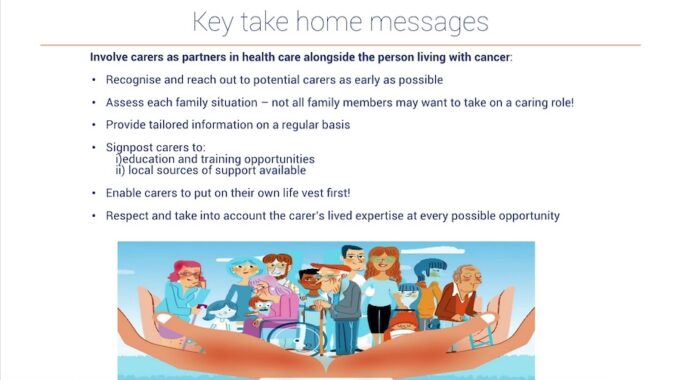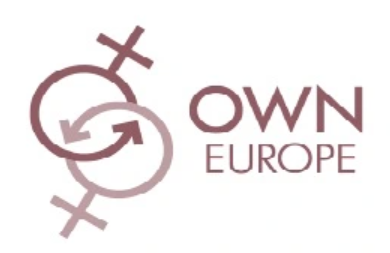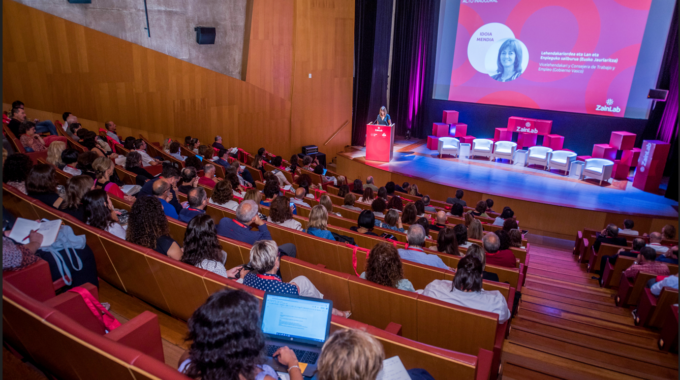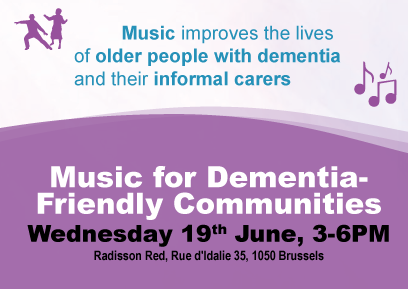
Supporting caregivers to optimize their role
The last webinar of Sharing Progress in Cancer Care “Spotlights on Improving Efficiency in Cancer Care – The case of the caregivers” was translated into an article on Cancer World.
You will see below the contribution of our colleague Elizabeth Hanson. Read the full article here.
Informal carers comprise approximately 10-20% of the total EU population. They are often a family member, predominantly a wife or a daughter, but they can also be a friend or neighbour. Women provide 2/3 of all care. The estimated value of informal care in Europe is between €320 & 368 billion – a substantial figure. Without the input of informal carers, our health and social care systems would almost certainly collapse overnight. Within the European policy context there is a strong focus on cancer right now, particularly with the ambitious Europe’s Beating Cancer Plan. Eurocarers – the European network representing informal carers and their organizations – has welcomed the plan’s clear recognition of the crucial role of informal carers. In collaboration with the European Cancer Patient Coalition, Eurocarers has produced a joint white paper outlining the role of cancer carers and their needs for support. An online Cancer Carers Toolkit was also co-produced, a useful information resource with tips and tools for carers of cancer patients.
The impact of caring varies, some caregivers find it intrinsically satisfying, meaningful, and rewarding, whereas others perceive it as stressful and burdensome. Women to a greater extent than men experience caring as physically and mentally demanding. Higher intensity caring, entailing more demanding tasks and longer hours, often carries a ‘triple penalty’: it can impact one’s own health and wellbeing, upset the balance between work, life, and care, and affect one’s social situation. Many carers can become socially isolated and excluded. They might also experience financial restrictions, because of the need to reduce their paid working hours, or even leave the workforce altogether to provide care for a sick relative. The COVID-19 pandemic has brought the spotlight on informal carers, as their situation has been exacerbated, with patients relying more on home care, and less support services being available both for caregivers and recipients.
Although most family members wish to care, not everyone does. Some relatives and friends may prefer to remain just that and not take on a caring role. Some may be ambivalent; some may be anxious about it. In the scenario of a conflict-filled relationship, for instance, assuming a caring role may lead to further strain. Choice here is key. Caring is not a static experience; it changes over time in response to the illness trajectory of the patient. For example, there can be more intensive periods of caring during the course of chemotherapy, followed by a relatively stable time, and so on. It is important that health care professionals work in partnership with families. For those carers who wish to care, the main goal should be to enable them to go from novice to “co-expert” as smoothly and quickly as possible, by providing information, education, training, and support tailored to the needs of the individual and the phase of caring they are facing. Healthcare professionals should carry out a carer assessment to explore to what extent a family member wishes to care for the patient, if at all, and to agree with both caregiver and recipient which tasks they prefer to carry out, which they would like to be helped with, and which they do not want to do at all. Top of the list of needs expressed by carers, time and again, is information. It would therefore be useful to assess the individual carer’s information needs and level of health literacy, including digital, in order for health carer professionals to present the appropriate information accordingly. It is also important to establish the carer’s preferred role in decision making together with their relative with cancer regarding the course of treatment of their relative. Many carers often request education and skills training because they want to do caring well and safely, without hurting their loved one or themselves. Education and training today can come in many formats: courses, individual or group sessions, and so on. Commonly the topics include the cancer illness, treatment, prognosis, coping strategies, planning ahead, and available supports. Multi-component psychoeducation seems to be more effective than single-component education. The core elements within multi-component psychoeducation are condition management, problem solving, communication skills, and assertiveness skills training to boost one’s confidence and coping strategies.
All carers need support, especially high intensity carers, who may well have been overworked for a long period of time. It can be practical help, such as night sitting services, assistive devices, and home adaptations. Working carers should be granted access to paid leave or, if not possible, unpaid leave. Equally important is information on, and help with, the financial supports that are available, such as benefits and pension credits. Carers need emotional and psychological support as well, in the form of talking to someone they can trust, and individual or group counselling. For high-intensity carers, access to quality respite care is essential, and to receive regular physical and mental check-ups, as they tend to put their own health needs last. Healthcare professionals should reach out early to family members and especially look out for those groups of carers who may be hidden from view, such as children and young adults, distance carers based in another part of the country or abroad, rural carers, and male carers, to name a few. A key strategy is to help maximize the positives and minimize the negatives of caring, that is, to encourage the carer to do those tasks they do well and enjoy doing, and arrange for help with the ones they do not want to do. Carers can benefit from sharing tasks with others, such as family members or friends, but also from receiving local professional support from the voluntary sector. Support to the carer should continue throughout the illness trajectory, and for a time after the end of treatment or following the death of the patient.
If adequately supported and based on choice, the caring experience can be an enriching one: a period of personal growth, leading to new roles and life opportunities.





